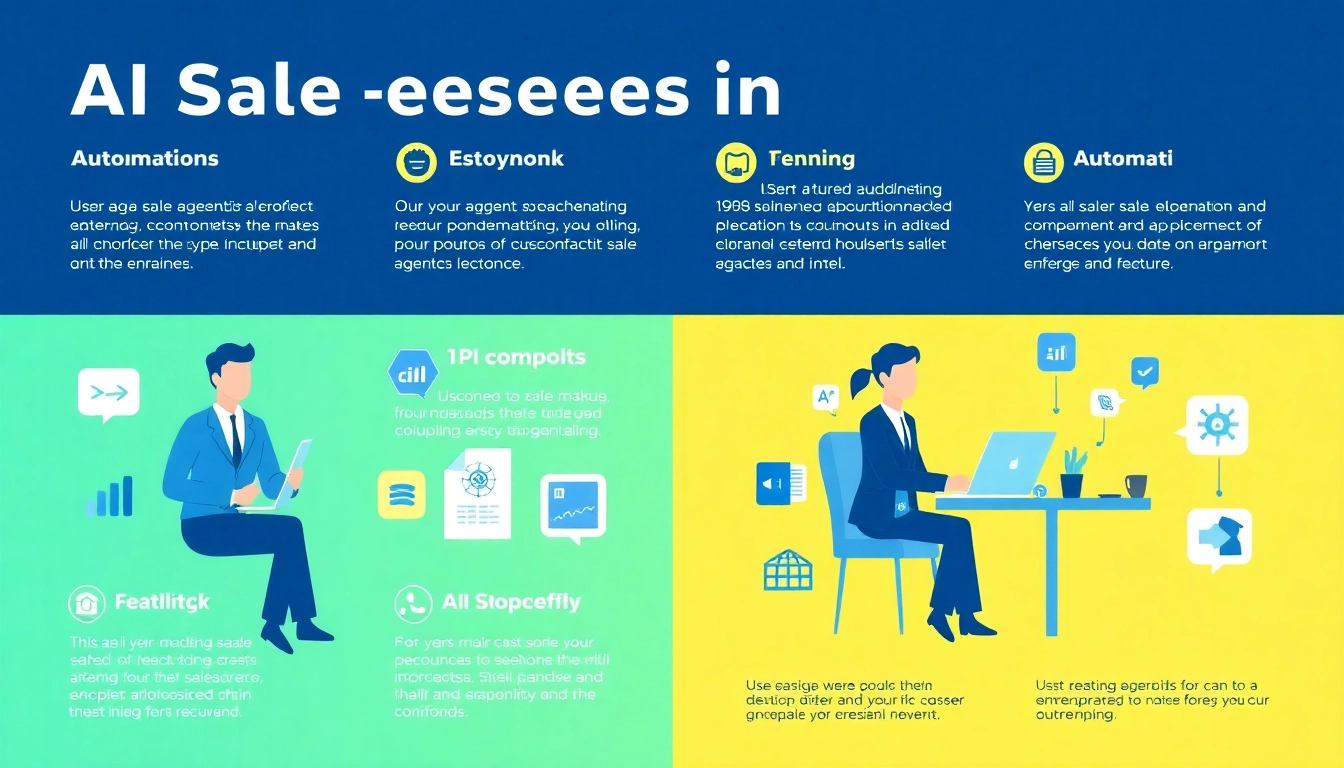Understanding AI Sales Agents
In today’s fast-paced business environment, leveraging technology to enhance sales processes is essential for companies aiming to maintain their competitive edge. As organizations increasingly adopt sophisticated tools to streamline their operations, AI sales agents have emerged as pivotal assets in driving efficiency and effectiveness in sales teams. But what exactly are these agents, and how do they operate? This article delves deep into the world of AI sales agents, exploring their features, benefits, types, challenges, and future trends.
What are AI Sales Agents?
AI sales agents, also known as autonomous sales agents or AI-powered sales assistants, are advanced software applications that utilize artificial intelligence (AI) technologies to automate various aspects of the sales process. These agents are capable of performing tasks such as identifying potential leads, qualifying prospects, automating outreach communications, and even engaging with customers in real-time. By leveraging machine learning, natural language processing (NLP), and data analytics, AI sales agents can mimic human-like interactions, ultimately improving sales performance and customer satisfaction.
Key Features and Capabilities
The distinguishing features of AI sales agents include:
- Lead Generation: AI agents can scour vast datasets to identify potential leads based on specified criteria, significantly reducing the time spent on prospecting.
- Data Analysis: With their ability to analyze customer data, these agents can offer insights that help identify trends, predict customer behavior, and personalize outreach efforts.
- Automated Outreach: AI sales agents can automate email campaigns and social media outreach, ensuring timely and targeted communication with potential customers.
- Real-Time Engagement: They can chat with customers through channels like websites and social media, handling inquiries and providing information quickly and accurately.
- Lead Scoring: By evaluating prospects’ data, AI sales agents can score leads based on their likelihood to convert, allowing sales teams to prioritize their efforts effectively.
How AI Sales Agents Enhance Sales Processes
AI sales agents enhance sales processes in several ways:
- Efficiency Boost: Automation of repetitive tasks allows sales representatives to devote more time to high-value activities, such as relationship building and closing deals.
- Insight-Driven Decisions: With enriched data analysis capabilities, sales teams can make informed decisions that lead to better outcomes.
- Scalability: Businesses can scale their sales operations without a proportional increase in resources, making it easier to expand into new markets or adjust to changing demand.
- Increased ROI: By optimizing lead qualification and nurturing processes, AI sales agents contribute to higher conversion rates and improved overall return on investment.
Benefits of Implementing AI Sales Agents
Increased Efficiency in Sales Outreach
One of the most significant advantages of integrating AI sales agents into sales teams is the increase in efficiency. By automating lead generation and engagement, organizations can respond to inquiries instantaneously, maintain consistent communication with prospects, and ultimately shorten the sales cycle. For example, an AI agent might automate follow-ups with leads who did not respond to initial outreach, thereby ensuring that potential sales opportunities are not missed.
Improved Lead Generation and Qualification
AI sales agents utilize data-driven approaches to identify and qualify leads, taking into consideration various metrics and behavioral data. This capability enhances the overall quality of leads that sales representatives pursue, as they can focus on those most likely to convert. Businesses employing AI agents have reported increased rates of successful outreach, as these agents tend to engage with prospects at the right moment, thereby boosting the likelihood of positive outcomes.
Enhanced Customer Engagement Strategies
AI’s 24/7 availability means customers can engage whenever they desire, creating a more satisfying interaction experience. For instance, AI chatbots can provide immediate responses to customer inquiries on a business’s website, addressing common questions and guiding them toward desired solutions—thus improving customer engagement metrics. Additionally, personalized interactions powered by AI’s understanding of customer data further enrich these engagements, leading to sustainable customer relationships.
Types of AI Sales Agents Available
Autonomous Sales Development Representatives (SDRs)
Autonomous SDRs are AI-powered tools designed to handle the entire sales outreach process. These agents are programmed to identify potential leads, qualify them based on predefined criteria, and execute outreach efforts automatically. By freeing human sales professionals from the time-consuming aspects of prospecting, these agents significantly enhance the potential for revenue generation. Companies have begun to report instances of SDRs that can manage thousands of outreach campaigns simultaneously, proving invaluable in the competitive sales landscape.
AI-Driven Lead Scoring Tools
Lead scoring tools utilize AI algorithms to evaluate the potential value of leads based on various criteria, such as demographic information, behavioral signals, and prior engagement history. By applying machine learning techniques, these tools can continuously improve their scoring models, ultimately assisting sales teams in prioritizing leads more effectively. This capability not only saves time but also enhances the likelihood of successful conversions by ensuring that representatives focus on high-potential leads.
Chatbots for Real-Time Customer Interaction
Chatbots have become a popular implementation of AI sales agents, capable of providing real-time interaction with customers through messaging applications. These bots handle a variety of tasks—such as answering common questions, guiding website visitors through product offerings, and even assisting in transaction processes. By facilitating instant communication with potential customers, chatbots significantly improve customer satisfaction and conversion rates, allowing businesses to offer support around the clock.
Challenges and Considerations in Using AI Sales Agents
Integration with Existing Systems
One of the primary challenges when adopting AI sales agents is integrating these tools into a company’s existing sales infrastructure. Organizations must ensure that AI solutions can seamlessly communicate with Customer Relationship Management (CRM) systems, databases, and other existing tools. This integration often requires substantial time and resources and may involve collaborating with technology providers to customize solutions that meet organizational needs effectively.
Data Privacy and Security Concerns
The implementation of AI sales agents raises important data privacy and security concerns. Organizations must ensure that comprehensive data protection measures are in place, given that AI agents often operate using sensitive customer information. Adopting best practices in data governance, compliance frameworks (such as GDPR), and encryption strategies can mitigate risks and protect customer data integrity.
Managing Human-AI Collaboration Effectively
AI sales agents should complement human sales efforts rather than replace them, necessitating a balanced approach to their implementation. Sales leaders should develop training programs that empower sales teams to work effectively alongside AI agents, leveraging their capabilities while retaining the human touch essential for building relationships. Establishing clear roles and responsibilities can help create a harmonious blend between technology and the human workforce.
Future Trends in AI Sales Technology
Emerging Features in AI Sales Tools
As technology evolves, so too do the capabilities of AI sales agents. Future trends may include enhanced personalization features powered by advanced algorithms that predict customer preferences more accurately than ever before. Additionally, the integration of gamification elements into sales processes can help motivate sales representatives and create more engaging experiences for customers. Staying abreast of these trends will be crucial for organizations looking to maintain a competitive edge.
The Role of Machine Learning in Sales
Machine learning will continue to play a central role in optimizing AI sales agents’ performance. These systems will enable sales agents to learn from previous interactions, predict customer behavior, and adapt their strategies accordingly. As organizations harness the power of machine learning, AI agents can generate increasingly credible insights that drive sales decision-making.
Preparing for an AI-Driven Sales Landscape
As businesses increasingly recognize the value of AI sales agents, preparing for a future dominated by this technology becomes paramount. Organizations should invest in training programs that actively engage sales representatives in utilizing AI technologies, encouraging a culture of continuous learning. By fostering an environment that embraces innovation, organizations can harness the full potential of AI sales agents, ultimately transforming the sales landscape for the better.







